Americans consume more potatoes than any other vegetable. They are highly nutritious, delicious, and versatile. It is uncommon knowledge that potatoes expire and become dangerous to eat over time.
So, are soft potatoes still good to cook and eat - or are soft potatoes bad for you? In many cases, a soft potato is just fine to cook and eat - but there are exceptions, and it is crucial to know them.
In this article, you will learn:
Potatoes are highly energy-packed, gluten-free, and fat-free, high-quality carbs (26 grams) that your body needs for fuel. With only 110 calories per serving, potatoes satisfy hunger and provide three grams of protein.

When Prepared Properly and Kept Away From a Deep Fryer, Potatoes Can Be Quite Healthy
Why is protein a big deal? Protein helps build strong muscles so you can perform your best all day.
Potatoes, including sweet potatoes, are also full of nutrients your body uses to function well. An entire potato is edible, including the skin.
They contain 45% vitamin C for iron absorption and collagen production and 10% vitamin B6 for carb and protein metabolism.
Potatoes contain more potassium than bananas. This electrolyte promotes healthy muscle function and helps lower blood pressure by balancing itself with sodium.
When your blood pressure stabilizes, the chance of heart disease and stroke decreases.
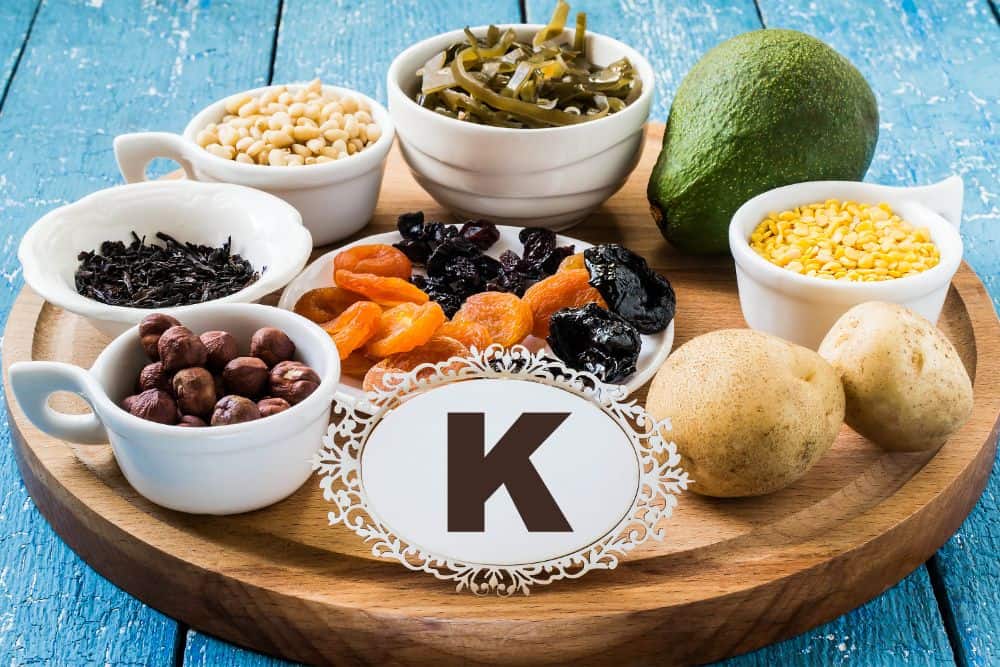
Potatoes are Have Highly Beneficial Potassium - More Than Bananas
Fiber has many health benefits, such as regulating blood cholesterol and glucose levels, promoting regular bowel movements, and making you feel full longer. The potato skin provides 50% of dietary fiber.
The fiber in potatoes consists of soluble and insoluble fiber, or resistant starch, gentler on the intestinal tract, producing less gas.
This unique starch acts like a prebiotic that promotes the growth of good bacteria, minimizing the symptoms of irritable bowel syndrome or constipation.
A large potato can contain 3.2 mg of iron, producing proteins that carry oxygen throughout the body. Sweet potatoes have slightly less (2.1) but are still iron-rich.
Potatoes are a perfect food choice for individuals with iron-deficiency anemia.
Potatoes contain antioxidants to protect the body’s cells from damage due to stress. Examples of antioxidants include Vitamins C and E, beta-carotene, manganese, selenium, and coenzyme Q-10.
Gordon Ramsay provides his advice on selecting the right cooking potatoes for your recipe.
Different Potatoes for Different Dishes
How long potatoes last varies on different factors. First, buy the freshest batch you can find, preferably without blemishes or eyes.
Potatoes should have firm, tight skins and smell earthy. Potatoes must stay dry to avoid spoiling. Wash them only before you plan to cook them.
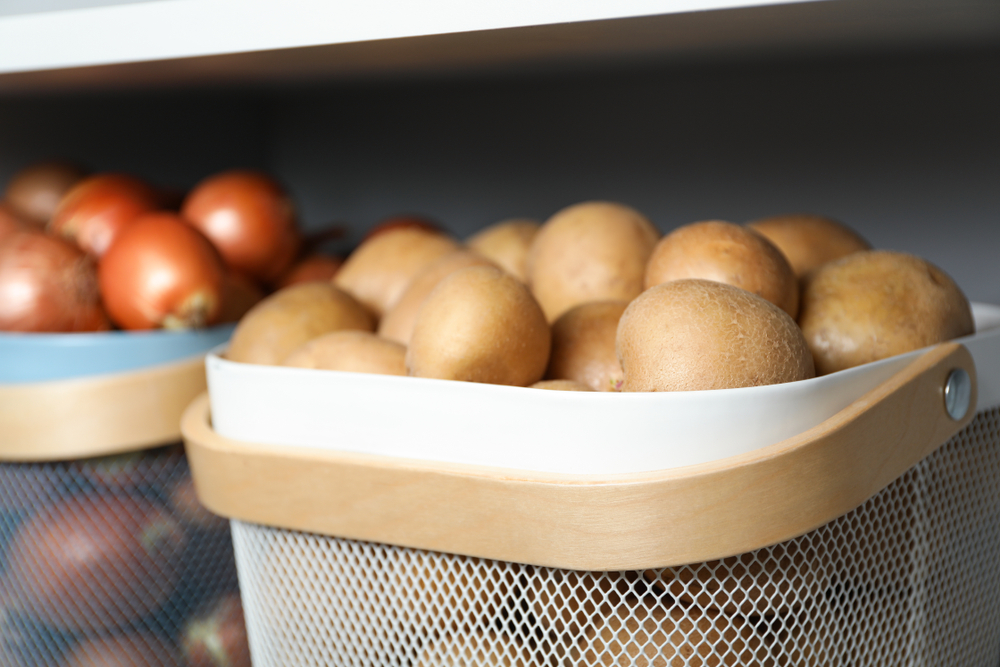
Store Potatoes in Cool, Dry Places to Keep Them Preserved
Different types of potatoes mature at various rates. To keep potatoes longer, the varieties to choose from are Yukon Gold and Gem, Elba, Burbank Russet, Fingerling, Red Pontiac and Chieftain, Khatadin, All Blue, German Butterball, and Kennebec.
Sometimes raw potatoes absorb too much light or heat and start to spoil. The best way to store potatoes is in dark and cool places, such as your pantry or cabinet.
After about two weeks, they will turn soft or grow sprouts.
Soft potatoes can still be good if there are no other flaws. The following conditions can indicate you have a rotten potato.
Growing mold anywhere on the potato would indicate it is not edible. Mold spores can spread contaminating the raw potato, so cutting off the moldy parts you can see will not eliminate all mold.
Any potatoes with a musty smell are unfavorable for consumption. Don’t eat moldy potatoes.
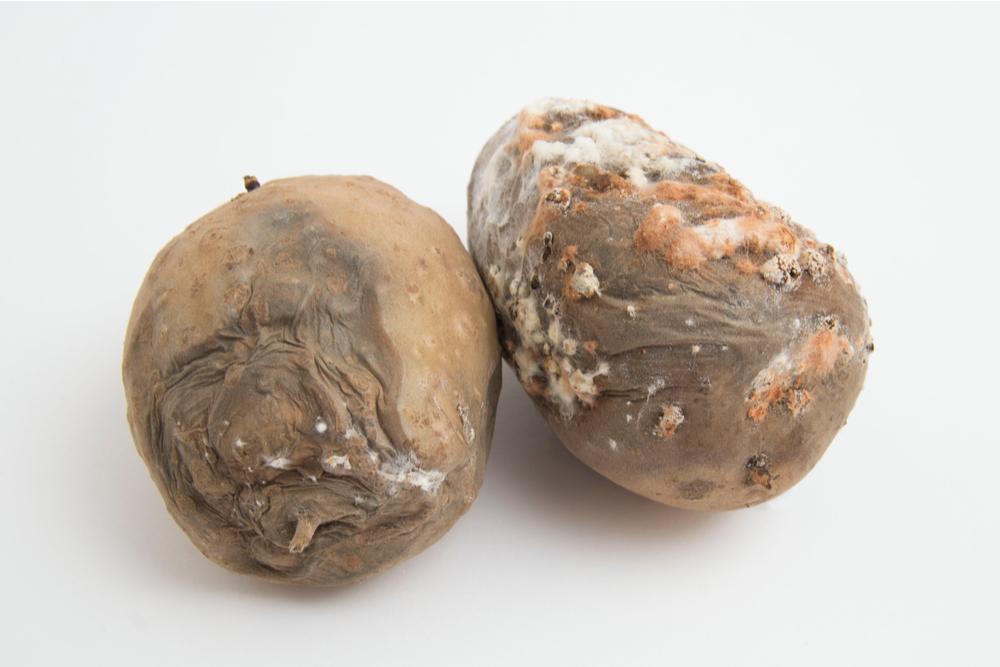
Moldy and/or Green Potatoes Shouldn’t be Eaten
Large potato sprouts that are long and wide signify that the vegetable is too ripe to eat. They
pull nutrients and sugars from the spud, wrinkling and shrinking it. It is safe to eat a sprouted potato after you remove each sprout, which contains harmful chemicals (solanine and chaconine).
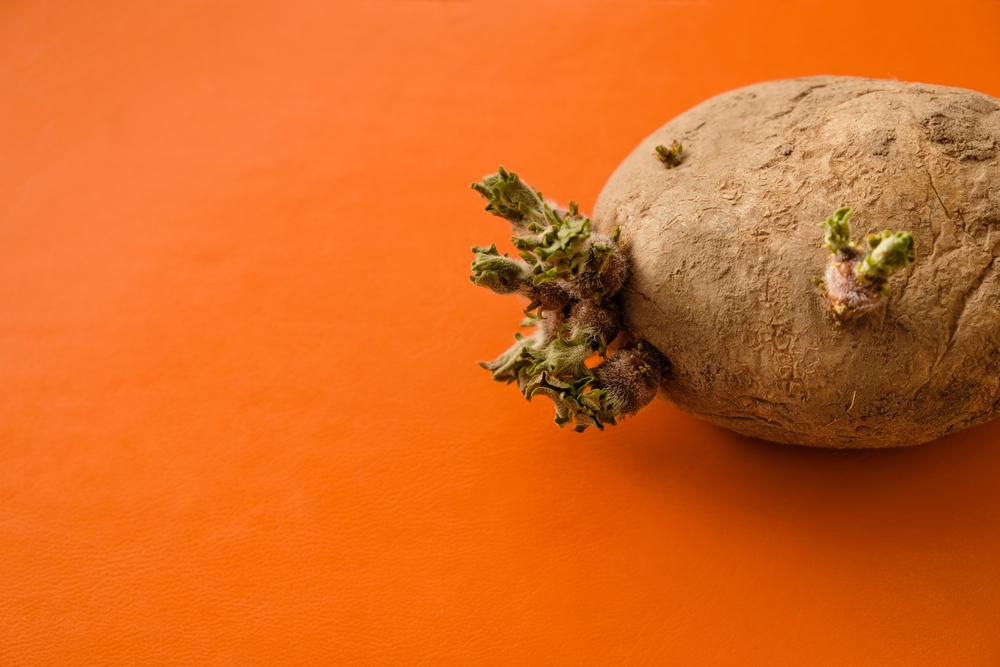
Potatoes that Have Sprouted May Still Be Edible - if the Sprouts are Very Small and are Removed. That Said, I’d Opt for a Different Potato.
Have you ever noticed a potato with green skin? That green color is evidence of solanine, which can cause unpleasant symptoms , such as nausea, headaches, fever, and neurological issues.
Solanine increases with light exposure and causes a bitter taste. According to "Dr. Potato" of the Idaho Potato Commission, if there are only a few spots on the skin, it is okay to peel the skin or trim around them, which is where the chemical compounds congregate.
Most people do not become sick after eating a small amount of solanine. However, there is no guarantee the potato will be safe to eat.
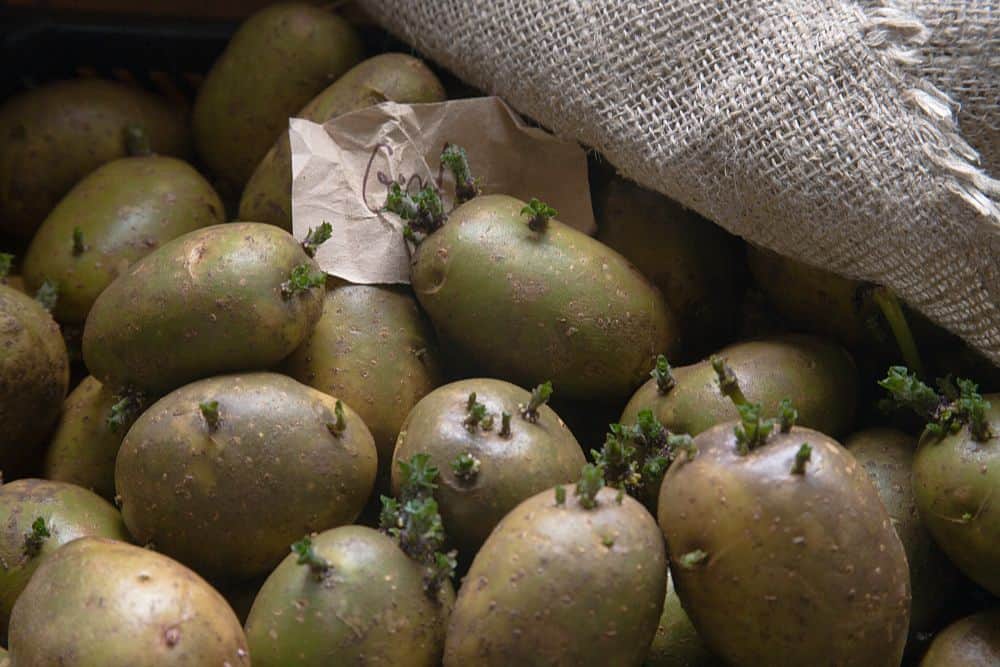
Green Potatoes Indicate Solanine Which Can Make the Potatoes Bitter - The Green Skin Combined With The Sprouts Indicate That These Potatoes Aren't Good for Eating
If the potato tastes bitter, toss it. Children are most susceptible to gastrointestinal symptoms and should not eat green potatoes.
Eating less than five grams per body weight of a green potato has been proven to have little to no symptoms, depending on the individual. Cooking them will not kill the toxins, so it might be best to discard them.
Soft potatoes that seem dry and shriveled up may have lost too much water and nutritional value. They are 80% water, and losing some is natural. Loss of excessive moisture may dehydrate them to the point of spoilage.
Black spots may not directly indicate the potato is rotting unless you smell an odor. At that point, toss it out. Sweet potatoes that are soft, mushy, and have a discoloration are not edible.
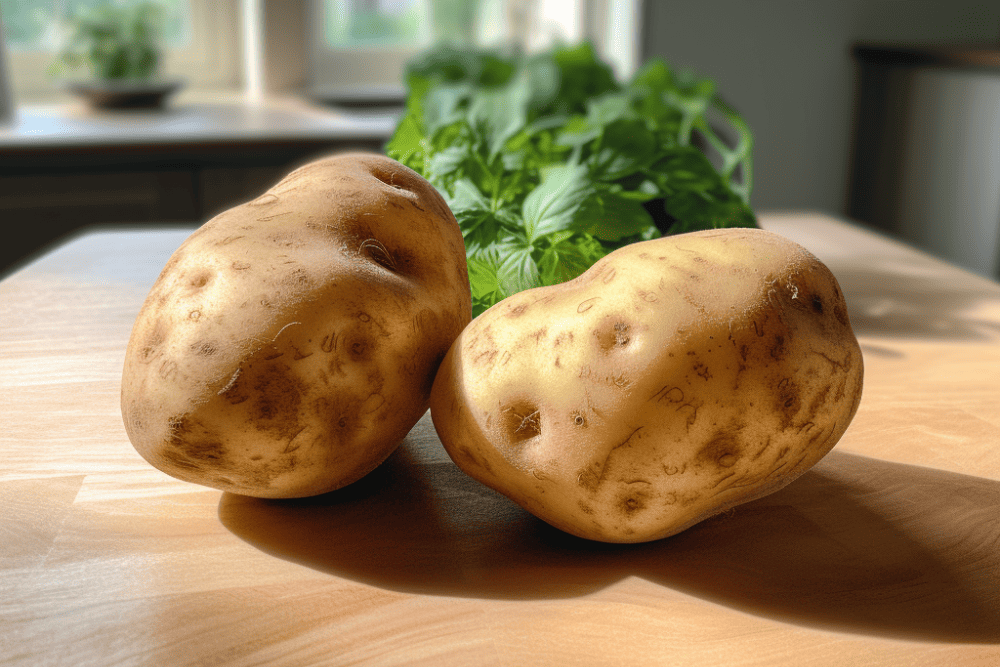
At a Glance, These Potatoes Look Appetizing - Just Make Sure They Aren't Mushy or Smell Bad
Just like humans, potatoes will begin to sag and wrinkle over time. When this happens, the other potatoes around them may suffer as well. Mushy potatoes lose flavor and are no longer nutritious.
Potatoes with a bitter or moldy smell are not suitable for eating or cooking. The odor originates from the chemical compound solanine.
Really rotten potatoes will smell like a decomposing body and are not safe to inhale. Toss them immediately.
Are soft potatoes still good to cook and eat? Yes, but there are exceptions. It is okay to cook soft potatoes, as long as they are not mushy, green, moldy, or contain sprouts.
Soft potatoes with green skins are not fit for cooking or baking because of their bitterness. All the sour cream and butter in the world won't salvage a bitter baked potato.
Soft spuds are perfect as mashed potato, twice baked potatoes, sweet potato casserole, or soups. If the potatoes are too mushy, they lack nutrients and taste, rendering them unsuitable for eating.
Eat cooked potatoes within four days to prevent bacteria from growing.
Traditionally, you can bake potatoes by cleaning them and seasoning the outside of the potato with salt and butter. You can then wrap the potato in foil and place it on a baking sheet.
The cooking time will vary depending on the size of the potato, but cooking time at 425 degrees can range from 45 minutes for smaller potatoes - and up to two hours for extremely large potatoes.
You can also save a bit of energy and perhaps a bit of time by baking your potato in an air fryer or toaster oven. This make sense for one or maybe two small potatoes.
An air fryer requires less energy than an oven and will heat up much more quickly than your oven.
According to Dr. Potato, there is no need to poke a potato that you're
Here are some answered questions that you might find beneficial.
A cooked potato carries a risk of contamination from bacteria the longer they sit. Illness can occur from salmonella, botulism, listeria, and staphylococcus. You may develop nausea, vomiting, diarrhea, abdominal cramps, muscle cramps, and fever. Throw them out after four days.
If you catch it early enough, you may be able to save the rest of the batch by removing the rotten potatoes. However, if you find one spoiled potato in the bag with multiple soft spots or dark spots, you’re better off not cooking from that batch of potatoes.
Yes, you can store potatoes in the freezer, but it is not wise. Freezing them can alter their taste and quality. The optimum temperature for potatoes is between 40 and 50 degrees Fahrenheit.
Yes. Like regular potatoes, yams can change color and leave you with a mushy potato. They also grow mold and sprouts, so check them carefully at the store. Store them as you would other potatoes.
Raw potatoes are safe to eat if there are no dark or green spots, sprouts, or moldy areas. Keep in mind that it may be challenging for the gut to digest.
Yes, individuals with diabetes can eat potatoes because of the type of carbs in them. Potatoes are starchy vegetables that contain complex carbohydrates that the body takes longer to oxidize. Your blood sugar can still rise but is easier to maintain. As with any starchy food, eat potatoes in moderation.
